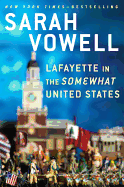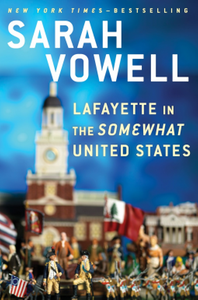
 In his 1998 routine Dress to Kill, English comedian Eddie Izzard explains that Americans cast British actors as villains in their movies because of the Revolutionary War, while the French play more likable characters "because of the debt of honor to General Lafayette." The punch line is met by quizzical silence from Izzard's San Francisco audience, to whom he deadpans, "You don't know who he is, do you." No less sardonic, though much more rigorously researched, Lafayette in the Somewhat United States by public radio's favorite historian, Sarah Vowell (Unfamiliar Fishes), clarifies exactly who the Marquis de Lafayette was, and how he came to aid the Yankees in the War of Independence.
In his 1998 routine Dress to Kill, English comedian Eddie Izzard explains that Americans cast British actors as villains in their movies because of the Revolutionary War, while the French play more likable characters "because of the debt of honor to General Lafayette." The punch line is met by quizzical silence from Izzard's San Francisco audience, to whom he deadpans, "You don't know who he is, do you." No less sardonic, though much more rigorously researched, Lafayette in the Somewhat United States by public radio's favorite historian, Sarah Vowell (Unfamiliar Fishes), clarifies exactly who the Marquis de Lafayette was, and how he came to aid the Yankees in the War of Independence.
The collective colonies that declared autonomy from King George III on July 4, 1776, might as well have declared their independence from one another while they were at it. Vowell devotes as much time to documenting the internal unrest among the States as she does their unified dissatisfaction with Britain. Factions formed from varying loyalties and conflicting opinions about how their newly founded republic might work best, festering into a political tumult the nation would not outgrow: the 2013 government shutdown threatened Vowell's access to national parks during her research for this book. "Other than a bipartisan consensus on barbecue and Meryl Streep," she muses about the American heritage of petulant disagreement, "disunity is the through line in the national plot." But the arrival and persistence of Lafayette, a 19-year-old orphan who inherited gobs of French aristocratic wealth before lighting out across the Atlantic, heartens her outlook a little.
Lafayette was a gallant, if occasionally inept, ally, the first in a steady influx of French soldiers promised prestige in the colonial army. However, this war was severely underfinanced. Good humored as she is, Vowell isn't one to sugarcoat the past, and her depiction of the American rebels frequently points out the fledgling nation's shortcomings, shortsightedness and shortness of cash. Both Britain and France were broke after the Seven Years War, leaving Britain to hike taxes on the colonies, the so-called Intolerable Acts. Armed with Benjamin Franklin's politesse, George Washington's valor, Thomas Jefferson's brains and young Lafayette's optimism, the colonial soldiers had little else to their names, including clothing, a fact that frequently left their French comrades clutching their pearls. With plentiful archives of letters and diaries, and educational vacations taken with her sister and nephew, Vowell brings to life a chapter in American history as only she--and the handful of kooky reenactors she meets along the way--can.
Though Lafayette's early fame is documented by names of roads, parks, squares and buildings throughout the United States, it's clear "that Americans [have] forgotten France's help in our war for independence in general and the national obsession with Lafayette in particular." With wit and candor, Sarah Vowell does fine work to undo this amnesia, along the way reminding readers that bitter disagreement is part of the American experiment. And maybe that's okay. --Dave Wheeler, associate editor, Shelf Awareness
Shelf Talker: The American Revolution is presented in comedic Technicolor by popular historian Sarah Vowell.

